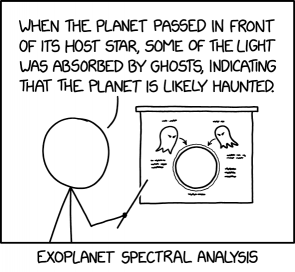2828: Exoplanet Observation
| Exoplanet Observation |
 Title text: NASA prefers to say that their rovers are 'looking for signs of past life on Mars' and not 'ghost hunting.' |
Explanation[edit]
In this comic, Cueball states that observations of light that passed through the atmosphere of a distant planet indicate that there are ghosts on that planet, because some of the light was absorbed in a way that is unique to ghosts. This is analogous to how gases or suspended particles absorb certain wavelengths, allowing scientists to identify properties of distant objects using telescopes. The pun is that in this comic "spectral analysis" refers to both the analysis of the light spectrum and the analysis of specters (ghosts).
Spectral analysis is the study of the electromagnetic spectrum that results from the interaction between electromagnetic radiation (including visible light) and matter. In the study of exoplanets and other distant objects in space, it refers to using the intensities of different frequencies of light (and other electromagnetic radiation) from stars which they occlude to infer data about their chemical composition. This is used to detect certain gases in the atmosphere, such as free oxygen, which might suggest generation by and for Earth-like life. On the day before this comic was published, NASA announced that spectral analysis of the exoplanet K2-18b showed abundance of methane and carbon dioxide, and shortage of ammonia, which are chemical footprints that support the hypothesis that it may have a life-supporting water ocean; and there was possible detection of dimethyl sulfide, which on Earth is only produced by life.[1] If confirmed, these would be very interesting findings, although it may turn out to be less remarkable on closer study (as with Venus for example).
"Spectral" also has another meaning: relating to specters (ghosts). Hence "exoplanet spectral analysis" could be interpreted as the analysis of ghosts on planets outside the solar system instead of the analysis of the elements that might be present on the planet. "Specter" and "spectrum" have the same etymological root, deriving from Latin "spectrum" meaning "appearance", with a specter specifically referring to a visible shadow or ghost.
The title text refers to the search for past life on Mars. Just like the comic, it also humorously conflates the practice of searching for signs of past life such as specific molecules or fossils (which NASA does actively search for), versus the disreputable practice of searching for ghosts, with this conflation framing both as an equally scientific indication of past life. In a very loose sense, real signs such as gases or fossils could be considered "ghosts" of past life.
Transcript[edit]
- [Cueball is holding a stick and pointing at a slide with two ghosts and a planet. The slide has unreadable scribbles of text and arrows pointing from the two ghosts toward the planet.]
- Cueball: When the planet passed in front of its host star, some of the light was absorbed by ghosts, indicating that the planet is likely haunted.
- [Caption below the panel]
- Exoplanet Spectral Analysis
Discussion
Probably, related to the recent Webb discovery of interesting gases in K2-18 b's atmosphere: https://www.nasa.gov/goddard/2023/webb-discovers-methane-carbon-dioxide-in-atmosphere-of-k2-18b Rps (talk)
I am not finding a reference, but I think I read that Newton chose the word "spectrum" by analogy with the word "spectre" (which means ghost), since the rainbow colors were sort of "hiding" in the white light and were revealed by the prism. So it is not a coincidence that you can make puns like on this comic. Rps (talk) 17:59, 13 September 2023 (UTC)
- Well, it seems to be at least co-conceived as a description of an (after)image of some original source, but it doesn't easily get explained as to whether it went from the latin root (to look at/view) straight via the 'ghostly' spectre and on unto the split-rainbow thing. (Except Newton did believe invsome seriously weird stuff, back when science was a bit looser and chemistry was almost alchemy, so... maybe!) 172.70.85.187 18:39, 13 September 2023 (UTC)
- First, in Newton's time, those stuff wasn't weird. Second, what do you mean by "almost"? -- Hkmaly (talk) 22:37, 13 September 2023 (UTC)
- It always amuses me that I have to teach schoolchildren that Newton was a 'scientist', a word that didn't really exist in his lifetime. He considered himself a 'natural philosopher', which at the time was a posh way of saying 'wizard', as well as being an alchemist. 'Magic' wasn't taboo then, but was seen as an acceptable hobby for the idle rich. Interestingly, although modern chemistry arose out of alchemy (but isn't even nearly the same thing), the magical practice of natural philosophy still goes on today, completely unchanged except for its name... we call it 'physics' now. BTW, Newton decided that the 'spectrum' was composed of seven colours (and inserted 'indigo' to fudge the results accordingly) because 7 is the 'God-number' in Kabbalah.--172.71.242.221 05:10, 14 September 2023 (UTC)
- First, in Newton's time, those stuff wasn't weird. Second, what do you mean by "almost"? -- Hkmaly (talk) 22:37, 13 September 2023 (UTC)
This explanation fails to take into account that if life were discovered through astronomy (as opposed to interstellar travel) on a planet that what is discovered would be "in the past." Because of the distance which light travels from other other stellar systems to earth everything which is observed by astronomy is "in the past". Thus the statement "past life" is exactly what astronomers are seeking to detect. Inquirer (talk) 20:32, 14 September 2023 (UTC)
Hi ProphetZarquon, regarding "shadow" (Revision 323794), I didn't realise it had etymological connection, sorry for removing. I still think that the word "shadow" feels out of place if there is no explanation, but I think your edit summary would be great as part of the article. I couldn't find any reference for Latin "specter" meaning "shadow", do you have one? --Hddqsb (talk) 14:29, 15 September 2023 (UTC)
